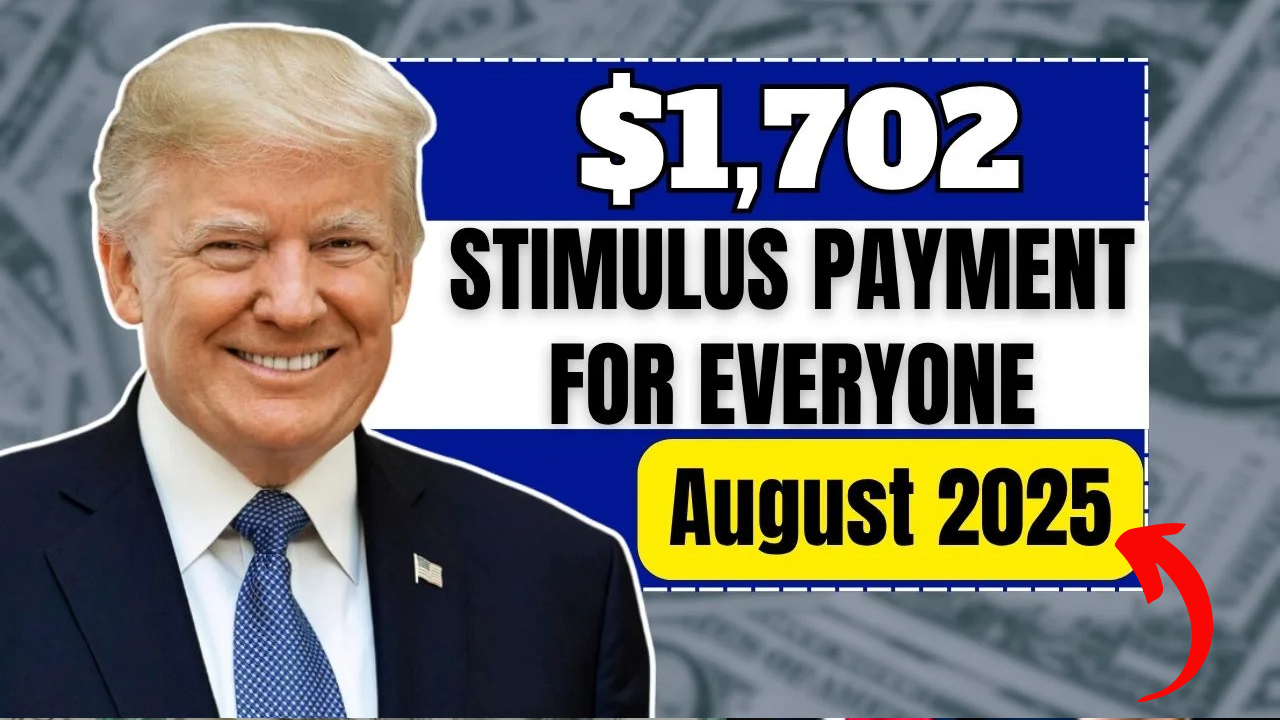There’s good news for millions of Americans this September! The federal government has officially released the payment schedule for the $1,702 stimulus payment, aimed at providing financial relief to eligible citizens. With inflation still impacting daily expenses and living costs, this payment comes as a lifeline for many households struggling to make ends meet.
In this article, we’ll walk you through who is eligible, the payment dates, how to check your status, and what you can do if you don’t receive your payment on time.
Why Is There a $1,702 Stimulus Payment in September 2025?
The $1,702 stimulus payment is part of an ongoing federal effort to support low- and middle-income households across the United States. Rising prices, housing costs, and overall economic uncertainty have prompted the government to issue this one-time payment as part of its economic stability program.
The Internal Revenue Service (IRS), in coordination with the U.S. Treasury, has confirmed that these payments are designed to:
-
Help families cover essential expenses like rent, groceries, and utilities
-
Provide temporary economic relief amid inflationary pressures
-
Stimulate the economy by boosting consumer spending
Eligibility for the $1,702 Stimulus Payment
Not everyone will automatically receive the payment. The IRS has laid out specific eligibility criteria based on income, tax filings, and residency.
Here’s a quick breakdown:
| Category | Eligibility Details |
|---|---|
| Income Limits | Individuals earning ≤ $75,000 annually; Married couples earning ≤ $150,000 |
| Tax Filing Status | Must have filed 2023 or 2024 federal tax returns |
| Residency | Must be a U.S. citizen or legal resident |
| Dependents | Additional payments may apply if you claimed dependents on your tax return |
| Social Security Recipients | SSI, SSDI, and VA beneficiaries are automatically eligible |
If you haven’t filed your 2023 tax return, it’s still possible to submit it and claim your payment. The IRS has set up a special portal for late filers.
September 2025 Payment Schedule
The IRS has officially announced the payment distribution dates for September 2025. Payments will be sent in phases based on your filing status and benefit type.
| Group | Payment Method | Payment Date |
|---|---|---|
| Direct Deposit (First Batch) | Bank accounts on file with IRS | September 10, 2025 |
| Social Security, SSI, SSDI | Sent automatically to linked accounts | September 13, 2025 |
| Veterans Affairs Beneficiaries | VA-linked accounts or cards | September 17, 2025 |
| Paper Check Mailings | U.S. Postal Service delivery | September 24, 2025 |
💡 Tip: If you’re expecting a paper check, allow up to 7 business days for delivery after the mailing date.
How to Check Your Stimulus Payment Status
The IRS provides an easy way to track your payment online:
-
Visit the IRS Get My Payment portal
-
Enter your Social Security Number (SSN) or ITIN
-
Provide your date of birth and address
-
View your payment status, method, and date
You can also sign up for Informed Delivery through the USPS if you’re expecting a paper check.
What to Do If You Don’t Receive Your Payment
If your payment doesn’t arrive on the expected date, here’s what you can do:
-
Double-check IRS records via the payment tracker
-
Contact your bank or payment card provider if you expected direct deposit
-
Wait at least 5 business days after the mailing date before reporting a missing check
-
Call the IRS helpline at 1-800-919-9835 for assistance
Impact on Social Security & Tax Refunds
The $1,702 payment is considered a stimulus credit, which means:
-
It does not reduce your Social Security benefits
-
It will not affect your 2025 tax refunds
-
You don’t need to repay the amount, as long as you meet eligibility
Frequently Asked Questions (FAQs)
1. Do I need to apply for the $1,702 stimulus payment?
No. If you filed your 2023 or 2024 taxes, you’ll get it automatically.
2. Can non-filers receive the payment?
Yes, but you must register on the IRS Non-Filer Tool before September 15, 2025.
3. Will the payment affect my SNAP or Medicaid benefits?
No, the payment is not counted as income for most federal assistance programs.
4. Can I get the payment faster?
Yes. Opt for direct deposit on your IRS account to avoid postal delays.
5. Is this the last stimulus payment?
For now, yes — but future rounds could be announced depending on economic conditions.
Final Thoughts
The $1,702 stimulus payment is a welcome relief for millions of Americans facing high living costs. With payments scheduled throughout September 2025, it’s important to check your eligibility, confirm your payment method, and track your deposit.
For many, this one-time payment will ease financial stress and help manage rising expenses. Make sure your information with the IRS is up-to-date so you don’t miss out.

